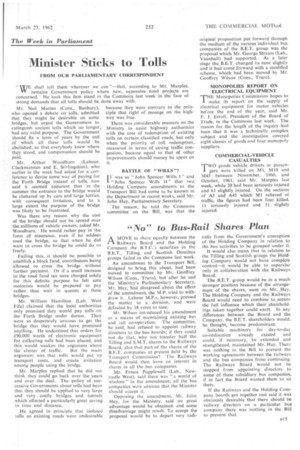"No" to Bus-Rail Shares Plan
Page 49

If you've noticed an error in this article please click here to report it so we can fix it.
AMOVE to share equally between the Railways Board and the Holding Company the B.T.C.'s securities in the B.E.T., Tilling and Scottish Omnibus groups failed in the Commons last week.
An amendment to the Transport Bill, designed to bring this about, had been moved in committee by Mr. Geoffrey Wilson (Cons., Truro), but after he and the Ministry's Parliamentary Secretary, Mr. Hay, had disagreed about the effect of the amendment, the M.P. tried to withdraw it. Labour M.P.s, however, pressed the matter to a division, and were defeated by 18 votes to nine.
Mr. Wilson introduced his amendment as a means of maintaining existing bus and rail co-operation. The committee, he said, had refused to appoint railway directors to the bus boards; if they could not do that, why not transfer half the Tilling and S.M.T. shares to the Railways Board, also that part of the shares of the B.E.T. companies at present held by the Transport Commission? The Railways Board would then have an interest in shares in all the bus companies.
Mr. Ernest Popplewell (Lab., Newcastle West). said there was " a world of wisdom" in the amendment; all the bus companies were anxious that the Minister should accept it.
Opposing the amendment, Mr. John Hay, for the Ministry, said no great advantage would be obtained, and some disadvantage might result. To accept the proposal would be to depart very radi
cally from the Government's conception of the Holding Company in relation to the bus activities to be grouped under it.
It would also mean that in relation to the Tilling and Scottish groups the Holding Company would not have complete con-trol—it would be able to supervise only in collaboration with the Railways Board.
The B.E.T. group would be in a much stronger position because of the arrangement of the shares, went on Mr. ,Hay. The Holding Company and the Railways Board would need to combine to secure the full influence which their shareholdings taken together could exert. In any differences between the• Board and the Company, the B.E.T. shareholders would, he thought, become predominant.
Suitable machinery for day-to-day co-ordination already existed and could, if necessary, be extended and strengthened, maintained Mr. Hay. There was nothing in the Bill to prevent the working agreements between the railways and the bus companies from continuing. The Railways Board would not be stopped from appointing directors to some of these subsidiary bus companies, if in fact the Board wanted them to sit there.
If the Railways and the Holding Company boards got together and said it was obviously desirable that there should be railway directors on a particular bus company there was nothing in the Bill to prevent that.




















































































































